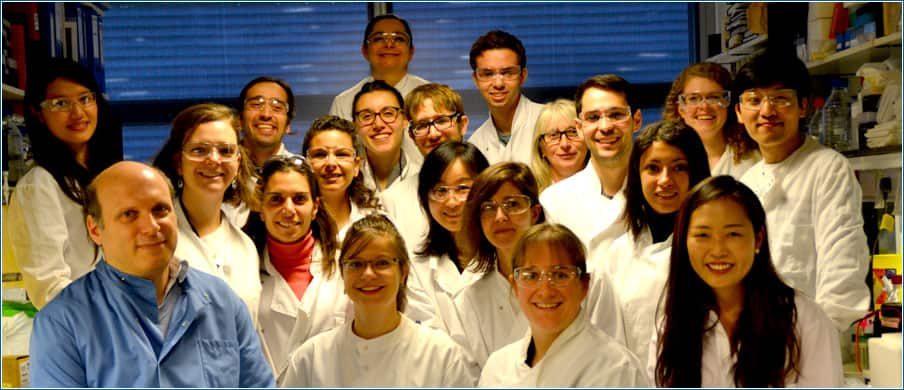Dr. David C. Rubinsztein
"Being a scientist is a wonderful job. However, you need to develop a thick skin, self-belief & persistence."
I'm David Rubinsztein, and this is why I research.
David Rubinsztein is Professor of Molecular Neurogenetics at the University of Cambridge. He completed medical training at the University of Cape Town and a doctoral degree in the Department of Medical Biochemistry at the University of Cape Town where he studied in the Unit for Cell Biology of Atherosclerosis. Dr. Rubinsztein has made significant contributions to the fields of neurodegeneration and autophagy by demonstrating that autophagy regulates the clearance of aggregate-prone, intracytoplasmic proteins that cause neurodegenerative diseases, such as Alzheimer’s disease and Huntington’s disease. His laboratory is currently involved in the development of therapeutics to treat neurodegenerative disease by targeting autophagy, in addition to basic biology studies to better understand the mechanisms regulating autophagosome biogenesis. Dr. Rubinsztein is the Deputy Director of the Cambridge Institute for Medical Research (CIMR), a Wellcome Trust Principal Research Fellow, and the Academic Lead of the UK Alzheimer’s Research UK Cambridge Drug Discovery Institute.

Would you tell us what sparked your interest in basic science?
I trained first in medicine before doing my PhD. I am interested in basic science because I want to understand how things work. I also believe that a better understanding of basic biology will enhance the ability to develop therapeutics.
Your research has helped characterize the biological link between autophagy and neurodegeneration. To you, what important questions in the field of autophagy are left unanswered?
From a cell biology perspective, it is still unclear how and where autophagosomes are formed. While we have many genetic clues, our understanding of real mechanism is still largely incomplete. From a physiology perspective, it will be interesting to know more about how autophagy is regulated in mammals.
You have made important discoveries in Autophagy. Is there one particular experiment or discovery you feel most proud of? An ‘aha moment’?
I am most proud of our discovery that autophagy regulates the clearance of the toxic, aggregate-prone, intracytoplasmic proteins that cause many neurodegenerative diseases and the initial series of cell, Drosophila and mouse experiments that showed that upregulation of autophagy was protective in Huntington’s disease and related conditions.
Tell us more about the questions you and your lab are currently trying to answer and where you see your research moving in the future?
We are working hard to understand the early events in autophagosome biogenesis and related signaling pathways. We are also actively pursuing targets for autophagy upregulation that may be accessible for therapeutics for neurodegenerative disease.
Describe why your research is important to the ordinary citizen.
Some of our research is quite translational and involves identification and characterization of potential therapeutic compounds that may have value in neurodegenerative diseases, which represent a major challenge and burden for mankind today. I believe that basic science is also valuable, in that it provides both a foundation for understanding biology on which other discoveries can be built, and very occasionally and often unpredictably reveals something really unexpected which may be transformative. Of course, we all dream about these elusive transformative moments. However, science needs the investment to increase the chances of these unpredictable breakthroughs.
Outside of autophagy, what research do you find especially exciting right now?
The advances in contemporary human genetics and the abilities to model genetic variants in cells and in vivo, provides opportunities for a much better understanding of the pathogenic pathways in common, important complex diseases, e.g. depression, schizophrenia.
Do you have any advice for someone interested in a tenure track position?
Being a scientist is a wonderful job. However, you need to develop a thick skin, self-belief and persistence. In addition, one needs to develop leadership and people-skills.
And finally, if you could have one superpower, what superpower would that be?
I do not believe in superpowers. However, I admire colleagues who are outstanding leaders who know how to say no or criticize without ever seeming to offend.
Select Publications by Dr. Rubinsztein:
- B Ravikumar, C Vacher, et al., mTOR inhibition induces autophagy and reduces toxicity of the Huntington’s disease mutation in Drosophila and mouse models. Nature Genetics 36, 585-595 (2004).
- B Ravikumar, A Acevedo-Arozena, et al., Dynein mutations impair autophagic clearance of aggregate-prone proteins. Nature Genetics 37, 771-776 (2005).
- B Ravikumar, K Moreau, et al., Plasma membrane contributes to the formation of pre-autophagosomal structures. Nature Cell Biol. 12:747-757 (2010).
- C Puri, M Renna, et al., Diverse autophagosome membrane sources coalesce in recycling endosomes. Cell 154, 1285-1299 (2013).
- K Moreau, et al. Autophagosome precursor maturation requires homotypic fusion. Cell 146, 303-317 (2011)
- M Vicinanza, VI Korolchuk, et al., PI(5)P regulates autophagosome biogenesis. Mol. Cell 57, 219-234 (2015).